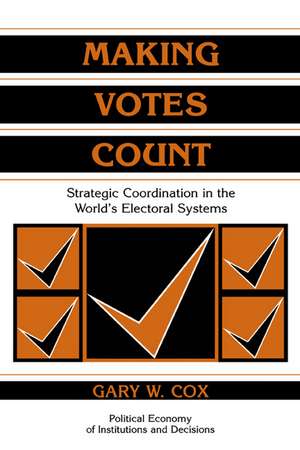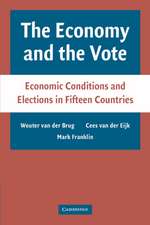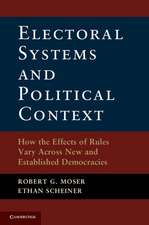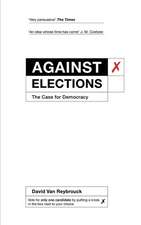Making Votes Count: Strategic Coordination in the World's Electoral Systems: Political Economy of Institutions and Decisions
Autor Gary W. Coxen Limba Engleză Paperback – 27 mar 1997
| Toate formatele și edițiile | Preț | Express |
|---|---|---|
| Paperback (1) | 321.14 lei 43-57 zile | |
| Cambridge University Press – 27 mar 1997 | 321.14 lei 43-57 zile | |
| Hardback (1) | 790.57 lei 43-57 zile | |
| Cambridge University Press – 27 mar 1997 | 790.57 lei 43-57 zile |
Din seria Political Economy of Institutions and Decisions
-
 Preț: 133.60 lei
Preț: 133.60 lei -
 Preț: 306.68 lei
Preț: 306.68 lei -
 Preț: 235.99 lei
Preț: 235.99 lei -
 Preț: 200.87 lei
Preț: 200.87 lei -
 Preț: 211.85 lei
Preț: 211.85 lei -
 Preț: 231.82 lei
Preț: 231.82 lei -
 Preț: 295.55 lei
Preț: 295.55 lei -
 Preț: 208.16 lei
Preț: 208.16 lei -
 Preț: 177.53 lei
Preț: 177.53 lei -
 Preț: 226.25 lei
Preț: 226.25 lei -
 Preț: 236.43 lei
Preț: 236.43 lei -
 Preț: 265.11 lei
Preț: 265.11 lei -
 Preț: 228.38 lei
Preț: 228.38 lei -
 Preț: 281.49 lei
Preț: 281.49 lei -
 Preț: 285.37 lei
Preț: 285.37 lei -
 Preț: 279.98 lei
Preț: 279.98 lei - 14%
 Preț: 773.75 lei
Preț: 773.75 lei -
 Preț: 233.38 lei
Preț: 233.38 lei -
 Preț: 247.41 lei
Preț: 247.41 lei -
 Preț: 203.12 lei
Preț: 203.12 lei -
 Preț: 230.33 lei
Preț: 230.33 lei -
 Preț: 286.69 lei
Preț: 286.69 lei - 14%
 Preț: 790.57 lei
Preț: 790.57 lei -
 Preț: 265.32 lei
Preț: 265.32 lei - 11%
 Preț: 554.15 lei
Preț: 554.15 lei -
 Preț: 287.07 lei
Preț: 287.07 lei - 11%
 Preț: 700.20 lei
Preț: 700.20 lei -
 Preț: 273.13 lei
Preț: 273.13 lei -
 Preț: 459.84 lei
Preț: 459.84 lei -
 Preț: 280.35 lei
Preț: 280.35 lei -
 Preț: 260.11 lei
Preț: 260.11 lei - 11%
 Preț: 640.30 lei
Preț: 640.30 lei -
 Preț: 286.89 lei
Preț: 286.89 lei -
 Preț: 247.80 lei
Preț: 247.80 lei - 11%
 Preț: 691.81 lei
Preț: 691.81 lei -
 Preț: 287.48 lei
Preț: 287.48 lei - 11%
 Preț: 641.80 lei
Preț: 641.80 lei - 11%
 Preț: 635.32 lei
Preț: 635.32 lei -
 Preț: 271.01 lei
Preț: 271.01 lei -
 Preț: 265.70 lei
Preț: 265.70 lei
Preț: 321.14 lei
Nou
Puncte Express: 482
Preț estimativ în valută:
61.47€ • 66.79$ • 51.67£
61.47€ • 66.79$ • 51.67£
Carte tipărită la comandă
Livrare economică 21 aprilie-05 mai
Preluare comenzi: 021 569.72.76
Specificații
ISBN-13: 9780521585279
ISBN-10: 0521585279
Pagini: 360
Ilustrații: 12 b/w illus. 16 tables
Dimensiuni: 152 x 229 x 23 mm
Greutate: 0.5 kg
Ediția:New.
Editura: Cambridge University Press
Colecția Cambridge University Press
Seria Political Economy of Institutions and Decisions
Locul publicării:New York, United States
ISBN-10: 0521585279
Pagini: 360
Ilustrații: 12 b/w illus. 16 tables
Dimensiuni: 152 x 229 x 23 mm
Greutate: 0.5 kg
Ediția:New.
Editura: Cambridge University Press
Colecția Cambridge University Press
Seria Political Economy of Institutions and Decisions
Locul publicării:New York, United States
Cuprins
List of tables and figures; Series editor's preface; Preface; PART I. INTRODUCTION: 1. Introduction; 2. Duverger's propositions; PART II. STRATEGIC VOTING: 3. On electoral systems; 4. Strategic voting in single-member single-ballot systems; 5. Strategic voting in multimember districts; 6. Strategic voting in single-member dual-ballot systems; 7. Some concluding comments on strategic voting, PART III. STRATEGIC ENTRY: 8. Strategic voting, party labels and entry; 9. Rational entry and the conservation of disproportionality: evidence from Japan; PART IV. ELECTORAL COORDINATION AT THe SYSTEM LEVEL: 10. Putting the constituencies together; 11. Electoral institutions, cleavage structures and the number of parties; PART V. COORDINATION FAILURES AND THE DEMOCRATIC PERFORMANCE: 12. Coordination failures and representation; 13. Coordination failures and dominant parties; 14. Coordination failures and realignments; PART VI. CONCLUSION; 15. Conclusion; Appendices; References; Subject index; Author index.
Recenzii
"Every serious scholar of political systems should read this book....Cox is a master when it comes to explaining ideas generated by a logic-based theory....this book is a very important contribution to our knowledge about electoral systems. It will be the major book in this area for some time to come." Melvin Hinch, American Political Science Review
"...this is a great book, a must for all those interested in the study of elections. Cox powerfully demonstrates the fruitfulness of looking at the impact of electoral systems from the perspective of formal theory, provided this is combined with solid empirical analysis." André Blais, Canadian Journal of Political Science
"This book is a unique contribution to the fields of comparative politics and formal political theory. It offers a model integrating many diverse aspects of electoral competition that together bring into existence systems of national poltical parties. Gary Cox combines social choice theory, public choice theory, spatial theory, and the institutional approach to electoral studies to reach a new level of understanding of political competition in democracies. Gary Cox's new book is not only a theoretical study, but also a useful reference on comparative electoral institutions. ...the suthor also draws attention to such often overlooked institutions as rules of candidate nomination and party registration." Olga Shvetsova, Political Science Quarterly
"...this is a great book, a must for all those interested in the study of elections. Cox powerfully demonstrates the fruitfulness of looking at the impact of electoral systems from the perspective of formal theory, provided this is combined with solid empirical analysis." André Blais, Canadian Journal of Political Science
"This book is a unique contribution to the fields of comparative politics and formal political theory. It offers a model integrating many diverse aspects of electoral competition that together bring into existence systems of national poltical parties. Gary Cox combines social choice theory, public choice theory, spatial theory, and the institutional approach to electoral studies to reach a new level of understanding of political competition in democracies. Gary Cox's new book is not only a theoretical study, but also a useful reference on comparative electoral institutions. ...the suthor also draws attention to such often overlooked institutions as rules of candidate nomination and party registration." Olga Shvetsova, Political Science Quarterly
Descriere
This book investigates strategic coordination in elections worldwide.












